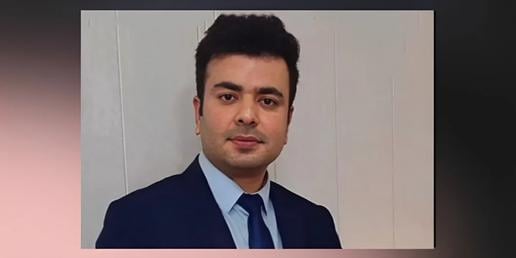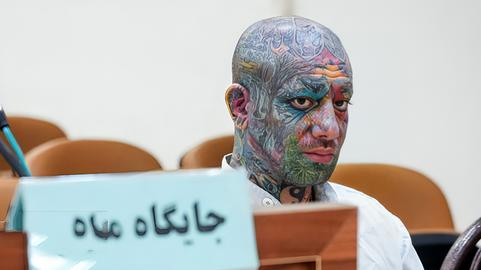Days after former Press TV anchor Sheena Shirani spoke out about how her bosses had sexually harassed her for years, two managers were given suspensions. But although the revelations hit the headlines, for many it was too little too late, a gesture that would essentially do nothing to change entrenched discrimination at the network — or the culture of silence that surrounds it.
“Nobody at Press TV can speak out about my case,” Shirani told IranWire. “That’s pretty much obvious. It will jeopardize their jobs and even their lives.”
Hamid Reza Emadi and Payam Afshar were both suspended on February 6, two days after Shirani’s revelations. She published a recording on Thursday, February 4, of a phone conversation with her boss, Press TV news director Hamid Reza Emadi, in which he asks her to satisfy him sexually because he has helped her in the past. Shirani also published messages from Emadi on her Facebook page.
Shirani, 32, worked at Press TV, an English-language division under the Islamic Republic of Iran Broadcasting (IRIB), from 2007 to mid-January 2016 as an editor, producer and news presenter. She has now left Iran with her son. Her whereabouts are unknown.
Although Emadi claims that the recording and messages were fabricated, Press TV has suspended him and Payam Afshar, the station’s studio manager.
In an official announcement on Monday, February 8, Press TV said the managers were suspended because of the importance of the case, but emphasized that the audio file in itself could not be used as legal evidence, and that Shirani had not made a legal complaint. It added that the case is now being investigated.
Press TV has also prohibited its employees from making any comments or sharing on social media about the case. According to an anonymous source with close links to Press TV employees, the management has blocked its staff’s access to Facebook and Twitter at work. It has removed tables and chairs in communal areas in an apparent bid to discourage socializing between colleagues.
Since IranWire reported the news on Friday, February 5, many international media outlets, including the Independent and New York Times have covered the story. Shirani herself has received much support — but also criticism and negative reactions to her accusations.
“I’ve already been accused of conspiring against the government by state officials,” Shirani told IranWire. “So anything they [Press TV staff] say to support me will have serious repercussions for them. However, they’ve still been kind enough to reach out to me privately and express their support.”
A former Press TV employee who spoke to IranWire on condition of anonymity said he had recently been in touch with colleagues who still work at Press TV:
“There’s an atmosphere of intimidation – that you should watch out and should not become ‘the second Sheena’. They feel that after this has happened the overall atmosphere of the channel has become much more closed and people are afraid to talk about this to others.”
He added that one of his former female colleagues at Press TV had contacted him on Facebook a couple of days ago, telling him that the staff were deeply concerned about Shirani.
“My former colleague, who still works at Press TV, messaged me, saying, ‘I feel I am being paranoid these days because of the events that have happened. Even now when I am typing, I am worried that Facebook is being tapped,” he told IranWire.
Sexual Harassment in Iran: An Ignored Problem
Press TV said in its statement on Monday that the case is “suspicious” because Shirani had published the recording without making a legal complaint. It added that Shirani’s audio file was published by opposition media, who allegedly “used it for political advantages”.
Many questions have been raised since she published the recording. Why did Shirani not file a legal complaint? And why did she wait for years before speaking out?
The short answer is most likely that nothing would have happened had she made a complaint. Overall, Iran’s legal framework is unable to support women who report sexual harassment, wherever it takes place. Instead, it strengthens the discriminatory conditions under which they work. When women make official complaints about sexual harassment in the workplace, at the very least they are simply ignored. And attempts to deal with the situation through the courts are often blocked.
“She must have heard that if a woman complained against her male boss, the boss was promoted,” said Shahrzad Mir Gholikhan, a former employee at IRIB who reported directly to the head of IRIB on the activities of the state television’s various departments, including Press TV.
Another former IRIB employee, Sara, told IranWire that she had to leave her job because many film producers asked her for sexual favors. ”When I refused, they didn’t give me jobs,” she said. “I didn’t complain about it because when one of my colleagues reported it to security at IRIB, not only was her case dismissed but she herself was accused of debauchery.”
Often, speaking out puts women at risk of even greater danger. Public attitudes towards harassment in Iran are frequently intolerant of victims and in many cases actually the victims are blamed rather than perpetrators.
The fact that the two managers were suspended is a very unique case, explains another former Press TV reporter, who also requested his name be not made public. While working at Press TV he saw many cases of harassment of both men and women, but they rarely received any attention.
“Three or fours years ago, something like this happened at Press TV, after a female colleague was harassed,” he says. “The female colleague was dismissed, and the guy who harassed her was given a raise. It was quite shocking. So the only reason that Press TV has been forced to suspend these people is that Shirani came out and talked about it, and it was picked up by a lot of media outlets.”
Shirani believes that the suspension of the two executives will do little to address the widespread sexual harassment problem in Iran. And although her case received widespread attention, Shirani has been forced to leave the country because she is concerned for her and her son’s safety.
“Those who dare to rape someone should be made aware that they would be tried before justice no matter how influential they might be,” Shirani told said in an interview on Voice of America’s Persian service – a satellite TV channel broadcast from outside Iran. “Powerless and innocent people in my society, men or women, should feel that their voices can be heard and that they are entitled to the right to protest. Someone should listen to their problems. A woman should not feel scared of verbalizing her difficulties.”
Related articles:
Press TV Anchor Sexually Harassed by Bosses for Years
Guards Forced Top TV Executive to Leave Iran
Unsafe Environment: Sexual Harassment at Work

























comments